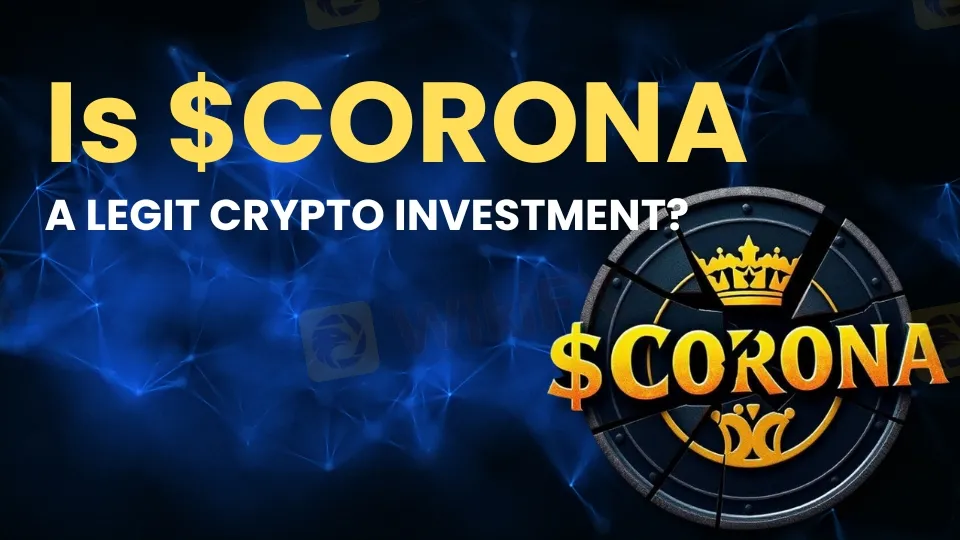简体中文
繁體中文
English
Pусский
日本語
ภาษาไทย
Tiếng Việt
Bahasa Indonesia
Español
हिन्दी
Filippiiniläinen
Français
Deutsch
Português
Türkçe
한국어
العربية
Is $CORONA Memecoin a Legit Crypto Investment?
Abstract:Explore if "$CORONA" memecoin is legit as Italy’s CONSOB bans its offer and blocks 11 crypto sites under MiCAR, targeting unauthorized services.

Italy‘s financial watchdog, the Companies and Exchange Commission (CONSOB) is cracking down on shady crypto operations, flexing its authority under the EU’s Markets in Crypto-Assets Regulation (MiCAR).
Just last month, the regulator shut down the websites of two rogue crypto providers. Now, its taking aim at a quirky new target: the “$CORONA” memecoin, a crypto-asset aggressively marketed to Italians through www.getcoronamemes.com. CONSOB has ordered a halt to its promotion, citing the absence of a required white paper—a key transparency document mandated by MiCAR.
But the clampdown doesn‘t stop there. This week alone, CONSOB blocked access to six websites offering unauthorized crypto services. Here’s the list of crypto-related sites now off-limits:
- “Spazio Finanziario” (spaziofinanziario.it and related pages)
- “HTXcoin-az” (m.htxcoin-az.com)
- “Stock Credit Wallet” (stockcreditwallet.com)
- “Paycraftv.top” and “Paycraftn.top” (paycraftv.top and paycraftn.top)
- “CoinBank Exchange” (coinbankexchange.icu)

These platforms were caught operating without MiCARs necessary approvals, leaving Italian investors vulnerable.
The regulators efforts extend beyond crypto-assets into broader financial abuse. CONSOB also shut down three sites tied to illegal financial intermediation:
- “Capitalgates” (capitalgates.io)
- “Tux” (tuxitu.com and tuxamity.com)
- “AquillaFX” (aquillafx.net and its client page)
In total, 11 websites were blacklisted this week, pushing the number of blocked sites since July 2019—when CONSOB gained its site-blocking powers—to an impressive 1,247.
For everyday Italians, this means safer browsing, but the blocks aren‘t instant. Internet providers are working to disable access, though technical delays might keep these sites live for a few more days. The “$CORONA” memecoin saga raises a bigger question: is it a clever gimmick or a risky scam? With CONSOB stepping in, it’s clear the regulator isnt laughing at the meme. Investors eyeing this or similar crypto-assets should tread carefully—unauthorized offerings like these often promise quick riches but deliver headaches instead. As Italy tightens the reins, the crypto Wild West might finally be meeting its match.

Disclaimer:
The views in this article only represent the author's personal views, and do not constitute investment advice on this platform. This platform does not guarantee the accuracy, completeness and timeliness of the information in the article, and will not be liable for any loss caused by the use of or reliance on the information in the article.
Read more

Think Scams Won’t Happen to You? That’s Exactly What Scammers Count On
We live in a world where information is everywhere. People are more digitally literate than ever before. Financial education is just a few clicks away. And yet, investment scams are not going away but they’re getting worse. It’s tempting to think that only the gullible fall for these tricks. But that’s far from the truth. Why? Because investment scams don’t target your knowledge. They target your emotions.

RM15 Million Gone in Fake Investment Scam
A 77-year-old Malaysian retiree has suffered financial losses totalling RM15.1 million after falling victim to an elaborate share investment scam orchestrated by an individual she knew personally.

Non-Existent Online Scheme Took Away RM580,000
A Malaysian assistant human resources manager has lost nearly RM580,000 to a fraudulent online investment scheme based in Taiwan.

Beware of New Scam Tactics Lurking on WhatsApp!!
A cryptocurrency scam linked to an entity known as “Txex” or “Whalefall” is sweeping across WhatsApp, exploiting the app’s popularity to target investors with promises of extraordinary returns.
WikiFX Broker
Latest News
SkyLine Guide 2025 Thailand Officially Launched: Judging Panel Formation Underway
FSRA Sanctions Hayvn Group and CEO for Regulatory Breaches and Misleading Conduct
Why Are More Regulated Brokers Providing Free VPS Services?
"Rate & Reward: Broker Review Contest"
2024 AI Ad-Blocking Performance Revealed
Five UK Financial Firms Collapse, FSCS Offers Support for Affected Clients
Why Trade Agreements Matter to Nations
Non-Existent Online Scheme Took Away RM580,000
RM15 Million Gone in Fake Investment Scam
SEBI Issues Warning Against Social Media Investment Scams
Currency Calculator


